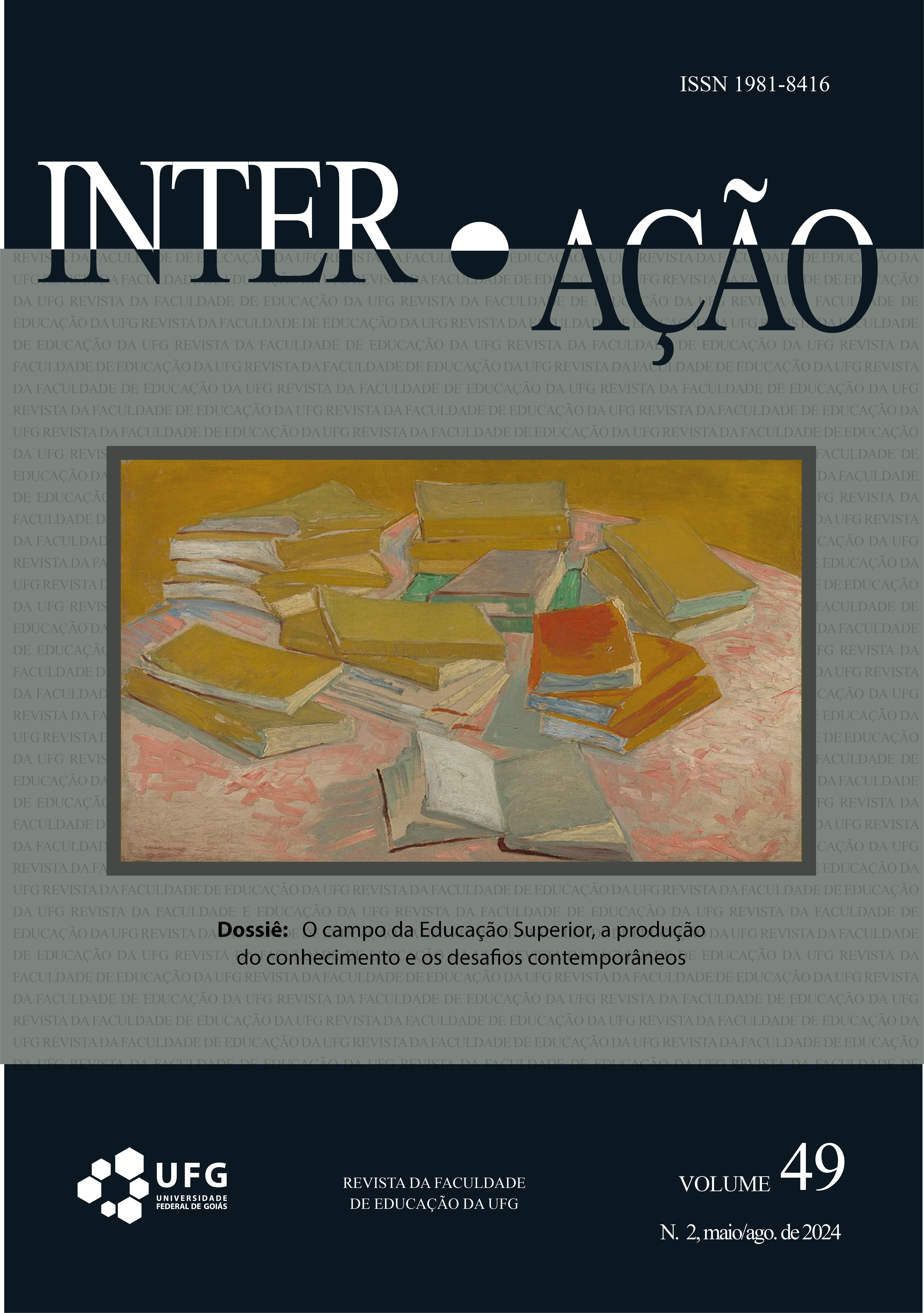A SOCIEDADE DO CONHECIMENTO NA AMÉRICA LATINA: A TRAJETÓRIA CUBANA COMO EXEMPLO SINGULAR
DOI :
https://doi.org/10.5216/ia.v49i2.79822Mots-clés :
Sociedade do Conhecimento;, Desenvolvimento Socioeconômico Sustentável;, Sociedade do Conhecimento em Cuba;, Economia do ConhecimentoRésumé
Este artigo explora a concepção cubana de sociedade do conhecimento no contexto do desenvolvimento socioeconômico sustentável, contrastando-a com as discussões latino-americanas sobre a temática. Através de uma revisão bibliográfica, o trabalho analisa a noção de conhecimento na língua inglesa e espanhola, as perspectivas sobre a sociedade do conhecimento para o desenvolvimento humano ou do capital, e a visão cubana com suas características socialistas. Conclui-se que Cuba, imbuída de sua história revolucionária e ideologia marxista-leninista, busca construir uma sociedade do conhecimento que se alinhe com o bem-estar social e econômico da população, priorizando a formação integral do cidadão socialista, a pesquisa aplicada e o planejamento centralizado.
Téléchargements
Références
BERNHEIM, Carlos Tünnermann; CHAUÍ, Marilena De Souza. Desafios da universidade na sociedade do conhecimento: cinco anos depois da conferência mundial sobre educação superior. Brasilia: Unesco, 2008.
BEZES, Philippe. Réinventer l’État. : Les réformes de l’administration française (1962-2008). Paris: Presses Universitaires de France, 2009.
BRUMNER, José Joaqguim. Peligro y promesa: la educación superior en América Latina. In: LÓPEZ SEGRERA, F.; MALDONADO, A. (Coords.). Educación Superior Latinoamericana y Organismos Internacionales: Un Análisis Crítico. Cali: Unesco, 2000.
DÍAZ-CANEL BERMÚDEZ, Miguel; ALARCON ORTIZ, Rodolfo; SABORIDO LOIDI, José Ramón. Potencial humano, innovación y desarrollo en la planificación estratégica de la educación superior cubana 2012-2020. Revista Cubana de Educación Superior, Habana , v. 39, n. 1, p. 1–28, 2020. Disponível em: https://orcid.org/0000-0001-6463-2507JoséRamónSaboridoLoidi3https://orcid.org/0000-0003-1653-6494. Acesso em: 19 jun. 2024.
DÍAZ-CANEL BERMÚDEZ, Miguel Mario; DELGADO FERNÁNDEZ, Mercedes. Gestión del gobierno orientado a la innovación: Contexto y caracterización del Modelo. Revista Universidad y Sociedad, Cienfuegos, v. 13, n. 1, p. 15–25, 2021. Disponível em: http://scielo.sld.cu/scielo.php?script=sci_abstract&pid=S2218-36202021000100006. Acesso em: 18 jun. 2024.
ESCANDELL-SOSA, Vicente E. La Batalla de ideas: fundamento estratégico para el desarrollo de una economía del conocimiento en Cuba. Ciencia en su PC, Santiago de Cuba, n. 4, p. 23–40, 2007.
FERNÁNDES LAMARRA, Norberto. Universidad, sociedade y conocimiento: reflexiones para el debate. Avaliação, Campinas/Sorocaba, v. 19, n. 3, p. 663–687, 2014.
FERNÁNDEZ FONT, Mario. Innovación tecnológica y competitividad: un intento de divulgación de conceptos, enfoques y métodos. México: Fundación Friedrich Ebert, 1997.
MOTA, Teresa Lenice Nogueira da Gama. Interação universidade-empresa na sociedade do conhecimento: reflexões e realidade. Ciência da Informação, Brasilia, v. 28, n. 1, p. 79–86, 1999. Disponível em: https://www.scielo.br/j/ci/a/J5dnNntKn3xYCgTrmckw3ZQ/?format=pdf&lang=pt. Acesso em: 18 jun. 2024.
MUNÕZ, Emilio. Espacios de conocimientos y su gestión: procesos de Gobernanza. Revista CTS, Buenos Aires, v. 3, n. 8, p. 159–172, 2007.
OGÉCIME, Mardochée. (Re)pensando a sociedade da informação e do conhecimento na periferia: um estudo de caso do Haiti. 2021. Tese (Doutorado em Ciência da Informação). Universidade Federal de Minas Gerais, [s. l.], 2021.
PARTIDO COMUNISTA DE CUBA. I Congreso del PCC: Tesis y Resoluciones Sobre Política Científica Nacional. Havana: Centro de Información para la Prensa, 1975a. Disponível em: http://congresopcc.cip.cu/congresos/i-congreso-pcc/#sdfootnote1sym. Acesso em: 25 abr. 2023.
PARTIDO COMUNISTA DE CUBA. I Congreso del PCC: Tesis y Resoluciones Sobre Política Educacional. Havana: Centro de Información para la Prensa, 1975b. Disponível em: http://congresopcc.cip.cu/congresos/i-congreso-pcc/#sdfootnote1sym. Acesso em: 23 abr. 2023.
QUINTANILLA, Miguel Ángel. La investigación en la sociedad del conocimiento. Revista CTS, [s. l.], v. 3, n. 8, p. 183–194, 2007.
ROTHEN, José Carlos; FERNANDES, Maria Cristina da Silveira Galan; ESTEVES, Thiago de Jesus. Política de Avaliação Educacional em Cuba. 2022. 1–20 f. Projeto de pesquisa - Universidade Federal de São Carlos, São Carlos, 2022.
SERNA, Aura González; GOMES, Edvânia Torres Aguiar; SILVA, Dweison Nunes Souza. Puntuando algunos de los desafíos de las universidades latinoamericanas en el futuro presente. Avaliação, Campinas/Sorocaba, v. 23, n. 3, p. 648–664, 2018.
UNESCO. Estudio sobre los antecedentes, situación actual y perspectivas de la evaluación y la acreditación en la República de Cuba. Havana: Cuba. IESALC/ Ministerio de Educación Superior, 2003. Disponível em: https://unesdoc.unesco.org/ark:/48223/pf0000140475. Acesso em: 18 jun. 2024.
Téléchargements
Publié-e
Comment citer
Numéro
Rubrique
Licence
© Maria Cristina da Silveira Galan Fernandes, José Carlos Rothen, Ivan Dos Santos Oliveira, Thiago de Jesus Esteves 2024

Cette œuvre est sous licence Creative Commons Attribution - Pas d'Utilisation Commerciale 4.0 International.
A Inter-Ação utiliza como base para transferência de direitos a licença Creative Commons Attribution 4.0 para periódicos de acesso aberto (Open Archives Iniciative - OAI). Por acesso aberto entende-se a disponibilização gratuita na Internet, para que os usuários possam ler, baixar, copiar, distribuir, imprimir, pesquisar ou referenciar o texto integral dos documentos, processá-los para indexação, utilizá-los como dados de entrada de programas para softwares, ou usá-los para qualquer outro propósito legal, sem barreira financeira, legal ou técnica.
Autores que publicam neste periódico concordam com os seguintes termos:
1) Autores mantém os direitos autorais e concedem à revista o direito de primeira publicação, com o trabalho simultaneamente licenciado sob a Licença Creative Commons Attribution que permite o compartilhamento do trabalho com reconhecimento da autoria e publicação inicial nesta revista.
2) Autores têm autorização para assumir contratos adicionais separadamente, para distribuição não-exclusiva da versão do trabalho publicada nesta revista (ex.: publicar em repositório institucional ou como capítulo de livro), com reconhecimento de autoria e publicação inicial nesta revista.
3) Autores têm permissão e são estimulados a publicar e distribuir seu trabalho online (ex.: em repositórios institucionais ou na sua página pessoal) a qualquer ponto antes ou durante o processo editorial, já que isso pode gerar alterações produtivas, bem como aumentar o impacto e a citação do trabalho publicado.















